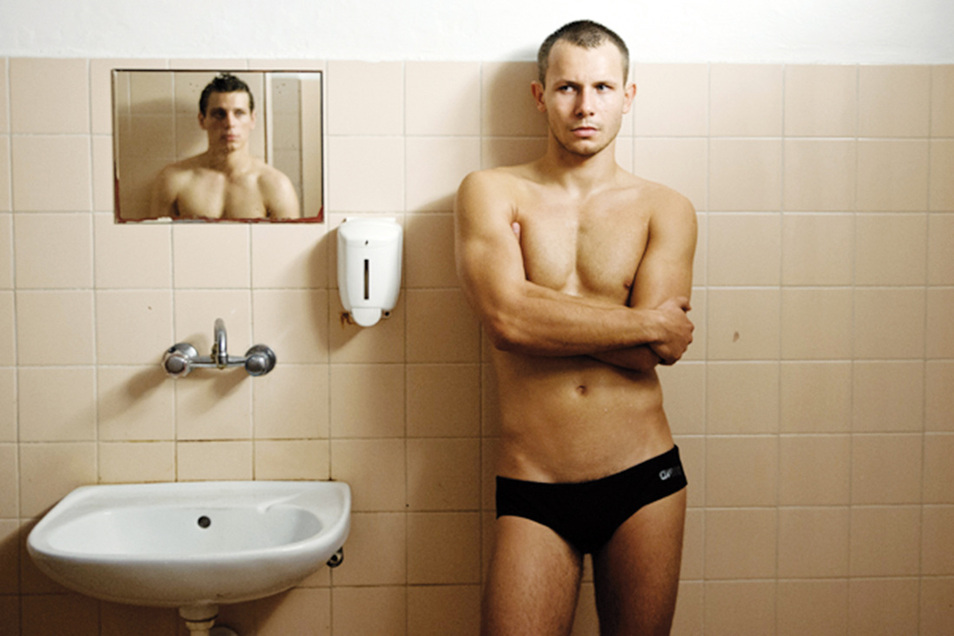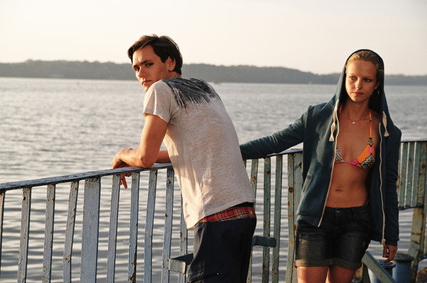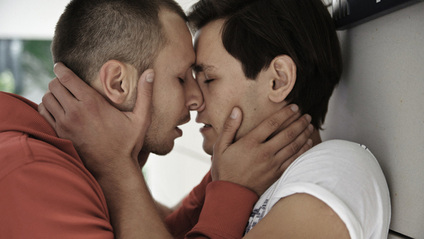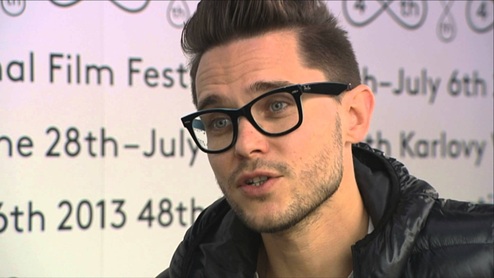Floating Skyscrapers
|
|
A distilled slice of unsettling Polish homophobia is the beating heart of Tomasz Wasileweski's bare-knuckled drama, Floating Skyscrapers. Wasileweski’s second outing as director is a muted and dramatic account of a young man’s homosexual awakening that often entertains stereotype. Floating Skyscrapers constructs the gay psyche as something more or less empathetic and often familiar; the bleak glimpse into Eastern European homophobia is rendered in brisk authenticity and fraught in silence.
Part of a recent crop of cinema that explores homosexual identities, including the widely acclaimed Blue is the Warmest Colour (2013) and Steven Soderbergh’s frilly and fanciful biopic Behind the Candelabra (2013), Floating Skyscrapers is a tribute to the LGBT (lesbian, gay, bisexual, transgender) film. The glum everyday of athletic swimmer Kuba (Mateusz Banasiuk) is trivialised by routine relationship troubles. Torn between the care of his mother and his imposing nag of a girlfriend, Sylwia (Marta Nieradkiewicz), it becomes clear that Kuba’s love affair with Michal (Bartosz Gelner) is nothing but problematic. Tensions are underscored as Kuba’s misfit relationship with Michal threatens his career and the heterosexual ruse with his girlfriend.
The urban veneer of Floating Skyscrapers makes Kuba appear minute and insignificant, further emphasising his marginalisation from society and his heterosexual scam masks his insecurities. The cinematography delicately frames Kuba's portrait and he is often seen submerged in a pool, naked and exposed. Floating on the surface of the water, he seems most comfortable and at peace. Perhaps this is his only sense of freedom when Kuba is often barred within the concrete confines of the cityscape or yet another gay cliché. To complement the setting, the absence of sound is both blissful and yet equally agonising. Kuba’s inner turmoil is vocalised by his surrendered physique and hunched frame when he sits pondering above an overpass with cars whisking by below to create a strange urban aurora. It results in a grand emptiness and Kuba’s plight creates an echo in the hollowed out shell of the Polish reality. But who’s listening? The frame of the shot often bobbles in an uneasy motion as it tracks the image of the troubled Kuba, as if slightly sickened by the images. Somewhat evocative of Darren Aronofsky’s more character-driven pieces Requiem for a Dream (2000) or The Wrestler (2008), Wasileweski’s visual technique is tethered to the characters to create intimacy. And yet Banasiuk’s performance is both rigid and repelling. Despite his success as a competitive swimmer, Kuba’s figure is wrought with internal despair, a man prosecuted by his country as much as by himself for his differences. Banasiuk instils quietness in the character that is offset by a lack of subtlety and cold indifference. He is hardly enjoyable, expressing almost no charisma or energy, and remains a depressed and miserable John Doe.
Ultimately Floating Skyscrapers is marred by conventional ploys and complete humdrum. Kuba, at one instance, rests aside an apartment block just as a pair of raggedly clad and gangly hoodlums direct homophobic slurs at Kuba. He retaliates with forceful vengeance both beating and pounding the young man into submission. The film succumbs to violent and needless scenes to measure and evaluate Kuba's sexuality. What this choice does, however, is refute the femininity that commonly characterises the gay male, instead empowering him and making him macho. Kuba’s heterosexual relationship becomes less a charade for the character and more a safeguard for the film. Just as Kuba can not quite seem to let go of Sylwia, the film is afraid of departing from heterosexual norms and the brief experiment with Kuba’s gay half seems almost trivial and alien. Wasileweski’s motivations may be in the right place, but it is informed by stereotype and convention. Floating Skyscrapers is a brief encounter with diverse sexual identities, swiftly brushed back away into the closet. |
Diegesis / Floating Skyscrapers is a drama/ romance, why did you decide on this genre to tell your story? While writing a script or directing I never think about the genre of the film. Floating Skyscrapers is a psychological drama. My first movie In the Bedroom (2012) was also a drama on a completely different theme from Floating Skyscrapers. I simply see the reality in this way and that is why I describe it in this way. In general I employ my intuition in making films, I follow my taste and search for the truth.
Diegesis / How did the story come about? It is a long story. The film initially was to be about a fifty-year-old woman and her relationship with her daughter and of that daughter’s relationship with another girl. When I was writing Floating Skyscrapers I was also writing the screenplay for In A Bedroom and my third film. It spanned over more or less four years. Throughout the four years I made many corrections, I had many versions of the script. In the end there was a version on love between two girls only. At the last minute I decided to make a film about boys after all. I assumed that it would be of more social influence.
Diegesis / Mainstream cinema has often resorted to stereotype in its depiction of homosexuality but there have been a few films recently that strive to challenge that. Were you conscious about responding to this with your film and what was your aim in telling this story? For me the most important thing in a film is always the truth. It is the only thing I follow. My heroes may act irrationally but they always have to be real. I must touch true things. That is the way they come into being. I realised that this time I was embarking on homoerotic love but I did not want to deal with this issue in any concrete or special manner. I was talking about love between people so I treated the heroes of Floating Skyscrapers simply as humans. I saw no reason why they were to be privileged only because they love someone of the same sex. They are neither leprous nor exceptional due to this love. They are ordinary, real and that is what is most beautiful in them. I constructed them with this thought on my mind and with this thought I led the actors on the set. That is why the heroes of Floating Skyscrapers are such and they are not different.
Diegesis / Kuba’s character has clearly been specifically designed to explore this topic, how important is it that he is a champion swimmer as opposed to any other line of work? The fact that Kuba is a swimmer is vital. The Academy of Physical Education, the changing room, the sports competition are perceived by the societies of the whole world as very macho and at the same time the notion of a homosexual is associated with the opposite to macho. It was important to me to juxtapose these two representations with each other. For Kuba’s character staying at the swimming pool, in the changing room with half-naked men was also very significant because in the film the social background is overwhelmed by the emotions, which are given top propriety. By placing the main hero in the male changing room, in the male world of sport I put him in the environment in which he apparently should not fit. However, the swimming pool is all his life. His teammates would probably not accept his presence in the showers if they knew that their naked bodies could excite him. The swimming pool for Kuba means freedom but it is also a cage for him.
Diegesis / What was it like working with Mateusz Banasiuk? Mateusz was very dedicated from the very beginning. He knew that it was a very important role in his career. Difficult, but very important. Mateusz had never played a main role before so he was even more dedicated to the film.
Diegesis / What are some other films that have influenced you and your work? Of course there are films that I love and directors who I appreciate. Their output is bound to influence me and my output but it is hard for me to assess to what degree. I love films by Urlich Siedl, Michael Haneke, Darren Aronofsky, Cristian Mungiu, Sofia Coppola. These authors make wonderful, important films.
Diegesis / What are your plans for the film now that it has played at London Film Festival and where can we expect to see it next? The film is scheduled for a very long tour all over the world. Later it will be shown in Norway, Germany, Taiwan. It has already toured half the world – NYC, Rio de Janeiro, Montreal, Karlove Vary, Zurich etc. London is only a short yet exciting stopover on our way.
Diegesis / Are you currently working on any projects and what can we expect from you in the future? Yes, I am finishing work on a script. It will be a portrait of a woman shortly after the fall of communism. I am excited about this project.
Floating Skyscrapers is now available on DVD released by Verve. |







